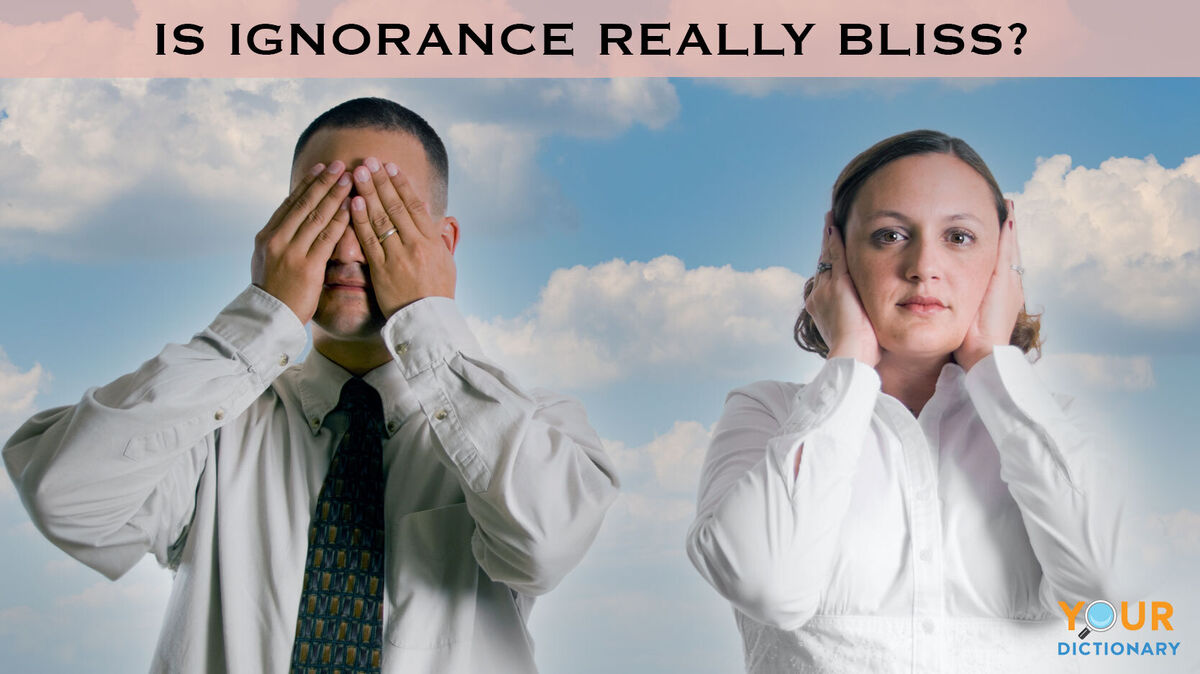
Ignorance, or a lack of knowledge, isn’t usually viewed as a good thing. However, there may be situations when you’re happier not knowing the truth. A common expression used to describe these situations is “Ignorance is bliss.” This phrase is an idiom, which is means that it isn't meant to be taken literally. Idioms can make a striking point but can’t be interpreted as actual fact. Take a closer look at a few examples of ignorance is bliss.
Origin of Ignorance Is Bliss
Eighteenth century English poet Thomas Gray wrote a beautiful poem in 1742 titled “Ode on a Distant Prospect of Eton College.” In it, he wrote:
“Where ignorance is bliss / ‘tis folly to be wise.”
You can see how this phrase isn’t meant to be taken literally. Gray was a poet, classical scholar and professor at Pembroke College in Cambridge. Surely, that’s not a man opposed to knowledge. Rather, he was waxing philosophical about a time when he was able to be ignorant — in his childhood. Surely, children know less than adults and are, therefore, allowed to enjoy their days without the proverbial “weight of the world” on their shoulders. So, while ignorance isn’t bliss exactly, it can make things seem lighter and more carefree.
Ignorance Is Bliss Meaning: Times When Ignorance Can Be Bliss
Ignorance can be defined as a lack of facts or knowledge. The idea that sometimes it's better not to know the truth is the crux of what ignorance is bliss means. Is it dangerous territory to be lacking in knowledge? Or is it sometimes a blessing in disguise? Consider some examples that illustrate "What does ignorance is bliss mean?"
- Ignorance is bliss for children who don’t know how much a trip to Disneyland costs. Some parents know they might return home to a massive credit card bill, and this could detract from their enjoyment in the moment. On the other hand, the children can blissfully carry their memories back to their friends and classmates.
- Ignorance may also be bliss when it comes to knowing how many calories are really in a decadent dessert. It's much easier to enjoy a piece of cake if you don't realize the chunk you're about to bite into has 450 calories (or more!) per serving. Here, a lack of knowledge can make for a guilt-free delight.
- Parents might experience a sense of ignorance is bliss if they’re unaware their child is sneaking out at night to date someone they don’t approve of. However, no one will be blissful when the “cat’s out of the bag.”
- Ignorance is certainly bliss for someone who doesn’t know that his or her spouse or romantic partner is stepping out with someone else. Of course, that bliss will be short-lived when the partner who is being cheated on discovers the truth.
- If a financially responsible person is married to someone who hides frivolous spending while pretending to also be frugal, that person is living in a state of ignorant bliss. Of course, that will change when the truth about the person's wasteful spending comes out.
- Ignorance is certainly bliss for a parent who thinks their child follows all the rules when, in reality, they’re out every weekend misbehaving with friends.
- Ignorance is bliss for someone who’s trying to start a new business but is unaware of all the limitations to their strategy. That ignorance may be just the thing that propels them forward instead of seeing only obstacles.
- After a playwright writes a new play, the author might steer clear of all the critics’ reviews, choosing to remain in a state of ignorant bliss for as long as possible. The person may prefer to remain free from a world of judgment.
- Ignorance may be bliss for people who refuse to turn on the news. They might not know that a robbery took place in their neighborhood last night and, therefore, be a little bit more carefree. However, is that type of ignorance actually bliss? They might need an extra lock on their doors at night.
- Ignorance may be temporarily blissful for a person who believes that the entire family loves their cooking. Meanwhile, their family members cringe at the thought of eating another meal prepared by the individual. At some point, though, the secret’s going to get out.
- If someone who is afraid of spiders doesn’t know there’s one living under the bed, ignorance would be bliss as long as the person is unaware that the spider is there. Hopefully, it never comes out to introduce itself!
- Ignorance would certainly be blissful for someone who just purchased a haunted house, even though the person is deathly afraid of ghosts. Buyer's remorse will set in if things start to go bump in the nights.
- Ignorance may also be bliss for someone shopping for a highly technical product. The customer who knows very little about cameras might buy one on sale and be perfectly (perhaps ignorantly) blissful about it. Meanwhile, another customer who’s extremely knowledgeable might get bogged down on specifications, features, comparisons, and reviews.
Ignorance Is Rarely Blissful Forever
Can ignorance really be bliss? Or should the truth always prevail? In most circumstances, it’s better to have all the facts at your disposal. Yet, sometimes, it’s nice to live in a world free from the strains of reality, similar to an innocent child, for at least a little while. Thomas Gray would’ve never touted an ignorant world as a blissful one. It’s just nice to reminisce about the naiveté of childhood from time to time. To no surprise, Gray wasn’t the only one to employ idioms in his writing. Check out these famous examples of idioms in literature.